People & Patterns: Transforming the ways we think and connect when everything is at risk
People & Patterns is a CSER project run by Paul Ingram and Sarah Woods using a whole systems approach to social and economic transformation at a time of global metacrisis.
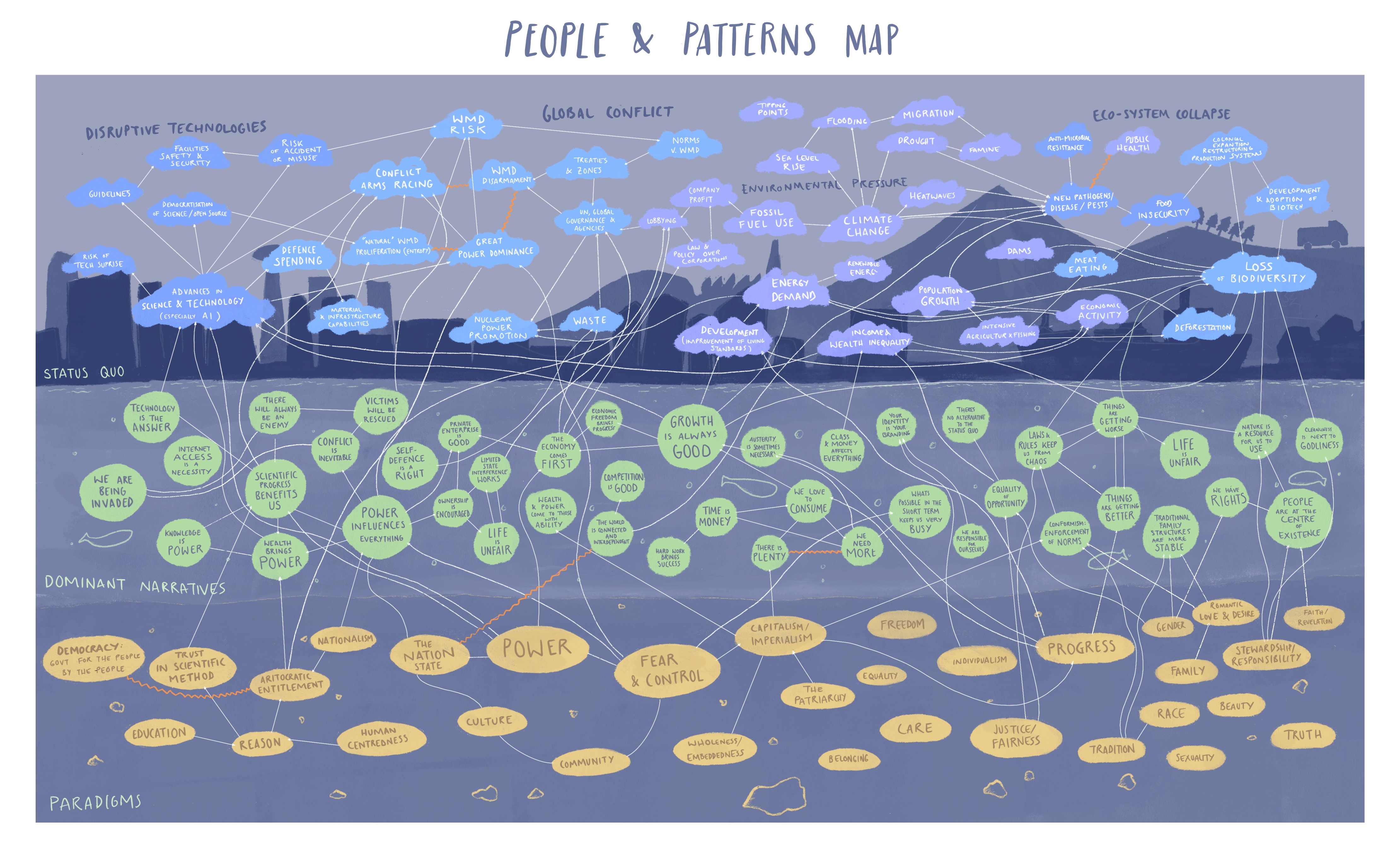
Contents
Introduction
Systems
Stories
Patterns
Who we are
What we're doing
What next
Introduction
The world is a complex place. In trying to make sense of it, we can find ourselves drawn to solutions that reduce a problem down to something simpler, or trying to solve it in a single lever-pull way. But in a world where everything is connected and everything is affected by everything else, this rarely gives us the outcome we need. Instead, it can end up creating harm or delay in other parts of the system.
“Healing the world will take radical changes in the ways we think, not just what we think”
People & Patterns offers a set of tools that help develop the ways in which we think, through storytelling and mapping of some of the key drivers, and beliefs behind the most critical global hazards we face. These methods look at the whole picture, considering the connections between the issues we often consider in isolation, and how this impacts upon our actions.
Systems
“A system is an interconnecting set of elements that is coherently organised in a way that achieves something… a system must consist of three kinds of things: elements, interconnections and a function or purpose” Donella Meadows
It is helpful to see our world as full of systems: from economic systems to political systems, transport systems to nervous systems. Yet often our disciplines encourage a reductionist approach that focuses heavily upon the nature of components within the systems rather than the relationships between them. We work with the idea that everything in the world is interconnected and interdependent – and that those connections are as important as the things themselves.
“By understanding the system and the ways the elements are interconnected, we can better manage the wicked problems that underlie global catastrophic risk”
Creative systems thinking can help us to see a bigger picture, to move around in the picture, to see it from different positions, not just our own perspective. It can enable us to see patterns and, in seeing them, understand better some of the causes and effects, and how they might be changed.
All of which tells us that creative systems thinking can be useful to us in approaching complex and ‘wicked’ problems.
Stories
"After nourishment, shelter, and companionship, stories are the thing we need most in the world." Philip Pullman
Story comes from lots of different places in our lives, so that at any point there are a number of different narratives playing out and intersecting for us.
- LOOKING IN: Stories We Tell Ourselves
We all have stories we tell ourselves, to make sense of our lives, about who we are and what our lives are like. - LOOKING AROUND: Stories We Share
We share stories with friends, family and our communities – whether they’re actual or online. - LOOKING OUT: Stories We Are Told
We receive stories from all sorts of agencies: from online, print and broadcast media, political parties, officials, charities and corporations. - LOOKING BACK: Stories We Know
We all carry stories from our cultural upbringings: myths, legends, religious stories and folk tales. - LOOKING FORWARD: Stories to Guide Us
At different times in history we have told different stories about our future. For the last two decades, our future visions have been dominated by dystopias and catastrophes.
Story works at all levels of our lives, from individuals to communities to societies, but often we’re less aware of them and the power they have than we might be – because they’re so much part of the fabric of our lives. People & Patterns shines a light on the stories we live in and with, so we can see them more clearly and understand their impacts on our lives, what they make feel possible and impossible.
Patterns
“If a factory is torn down but the rationality which produced it is left standing, then that rationality will simply produce another factory. If a revolution destroys a government, but the systemic patterns of thought that produced that government are left intact, then those patterns will repeat themselves.” Robert Pirsig, Zen and the Art of Motorcycle Maintenance.
This project uses a variety of patterns, often those found in living systems and the natural world, to help us to rehearse new ways of thinking, being and acting. Connections, disconnections, semi-permeable membranes, flux and flow are some of the patterns we use to engage with the complex issues we’re faced with.
Engaging with problems at a pattern level can enable us to better recognise underlying processes that are informing surface behaviours.
Who are we?
What we're doing
During the Spring and Summer of 2023, we held a series of three UK workshops in Cambridge and London, to explore our ideas with a range of people with allied lived and learnt experience.
Nuclear Cultures 24th April 2023, The Foundry, Vauxhall
Our first workshop brought together members of the UK nuclear policy community and others with related perspectives to identify and explore the narratives that are drive nuclear cultures and policy-making, asking: What are their strengths and weaknesses? How can we more successfully work together to assess these with greater awareness of alternative possibilities?
We spent our time together identifying and representing some of the core belief systems and assumptions that drive current policies and practices, and exploring, from three currently competing perspectives, the limitations that these impose on our sense of what is possible. We mapped the narratives within these perspectives with a spirit of open enquiry.
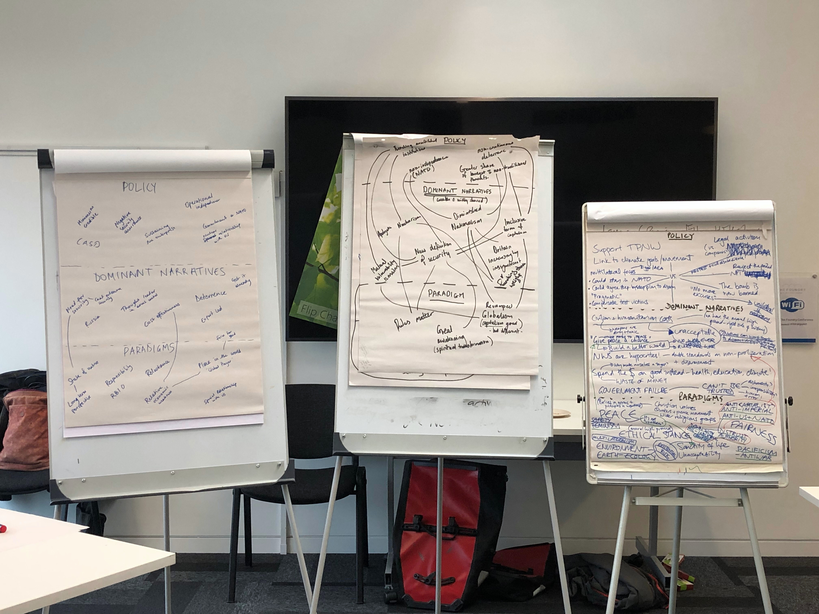
Walls & Doors, 11th May 2023, The Pitt Building, Cambridge
All of us are held through life by systems and stories, some that work for some of us and others that work against us and make ‘others’ of us. These formal and informal structures tell us what’s possible and not possible in life, sometimes violently and deliberately – through both personal and political means – sometimes simply by making invisible some choices and identities.
Using the creative systems and communication methods that we’re developing, this workshop brought together people with lived and learnt experience of those structures, to explore the walls and doors we face and how better understanding their patterns, and transforming or removing them and the stories we tell about them, can create change.
Systemic Risk 20th June 2023, Moller Institute, Cambridge
20th century linear, mechanistic thinking is failing us, as a diverse set of interconnected hazards begin to overwhelm our institutions and approaches. Using the creative systems tools developed in the previous workshops, we brought together a wide-ranging multi-disciplinary group of experts, thinkers and artists, including those working with a range of hazards, to look at the narratives that support our existing approaches and explore how we might develop new ones, taking as our starting point the idea that we need to change how we think as much as what we think.
Sub groups created maps exploring the dominant narratives and paradigms driving policy-making in particular hazard areas, such as nuclear war, biological weapons and climate change, before we came together to imagine and map the broader system.
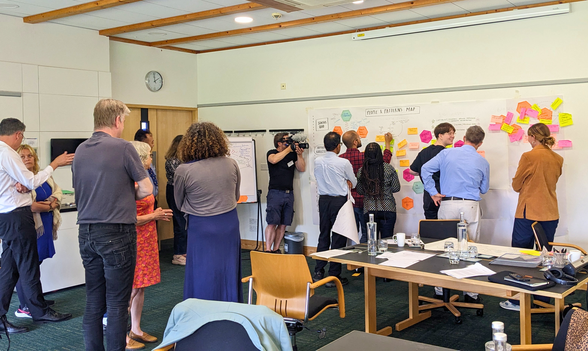
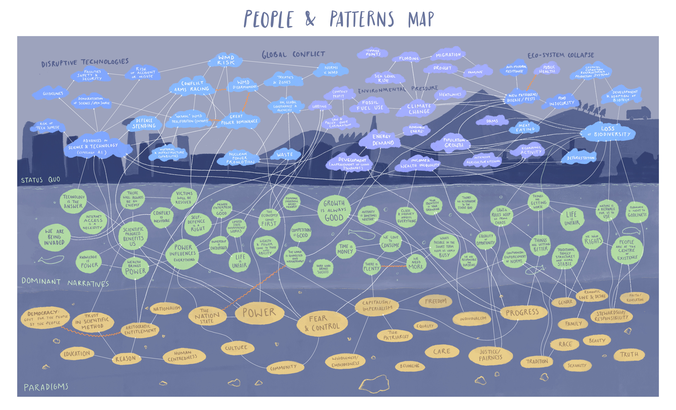
Click to expand People & Patterns map
IIASA Visit, July 11th & 12th 2023, Vienna
In July 2023, we visited the International Institute for Applied Systems Analysis in Vienna. We hosted a workshop to share the result of our work to date and to explain the methods we have been developing. The workshop was attended by around 15 researchers at the various stages of their career, representing different IIASA programmes, and the discussion ranged around alternative narratives applied to a variety of sectors including energy, defence and emerging technologies.
The researchers’ respective insights significantly enriched our systems mapping and our expression of the underlying patterns behind the global risks we face.
This workshop was followed by smaller meetings to discuss specific research ideas and possible collaborations.
Our visit was initiated and facilitated by the co-ordination team of IIASA’s Transformation within Reach (TwR) initiative.e
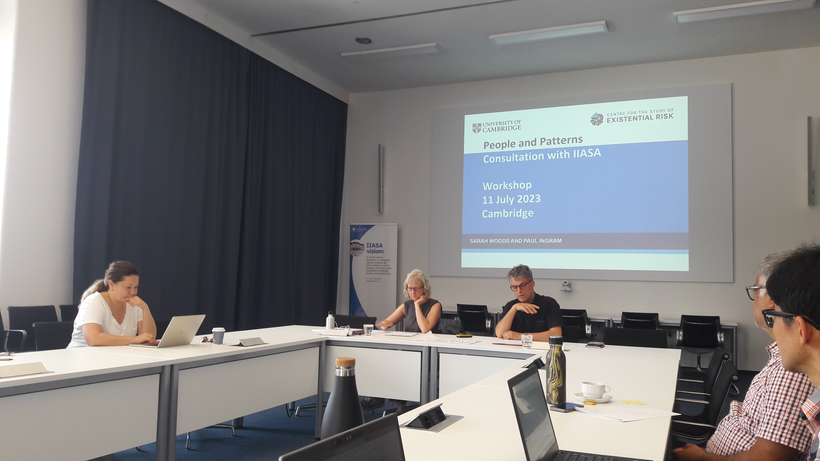
Fulbright Research
This autumn, Sarah is in the United States on a Fulbright scholarship, where her research continues to develop and inform the project. In addition to continued testing of the project methodologies, she is meeting with systems thinker Fritjof Capra, ecosystems ecologist Brian Fath, and the evolutionary biologist David Sloan-Wilson.
She is also developing her Pattern Thinking research.
What next?
We are currently reviewing our next steps, which in 2024 include the communication of our research to a wider public through a drama-documentary podcast series, weaving interview and conversation with drama to communicate how and why shifting our thinking can affect our ability to make the changes we need to see in the world.